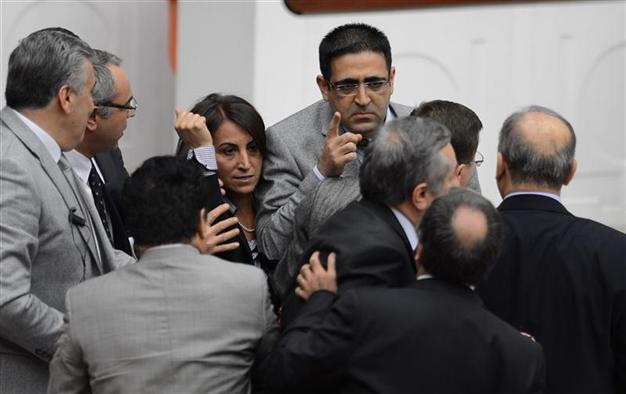Scuffles at Parliament over defense in Kurdish
ISTANBUL

Deputies of the Nationalist Movement Party (MHP) and the Peace and Democratic Party (BDP) nearly came to blows. DAILY NEWS Photo, Selahattin SÖNMEZ.
A heated debate took place in Turkish Parliament during a crucial session regarding a law enabling Kurdish suspects to speak in court in their mother tongue at hearings of the Kurdistan Communities Union (KCK) trial. After hours of tense discussions the session was postponed shortly after midnight without finishing the official vote.
Deputies of the Nationalist Movement Party (MHP), who have vocally opposed defense in mother tongues, nearly came to blows with Kurdish representatives of the Peace and Democratic Party (BDP) in the first half of the debate, but were eventually separated with some difficulty after discussions heated up.
Oktay Vural, the MHP’s parliamentary group deputy chairman, criticized the proposal and argued that approving the measure would amount to accepting a request from the outlawed Kurdistan Workers’ Party (PKK). “This law aims to legitimize the sovereignty of terror,” Vural said in a vehement speech.
Meanwhile, deputies from the BDP loudly criticized deputy Parliament speaker Sadık Yakut for giving the floor to Vural. The BDP’s parliamentary group deputy chairman, İdris Baluken responded to Vural by accusing him of “creating propaganda.”
In the second half of the debate, tensions boiled over again, this time between members of the main opposition Republican People’s Party (CHP) and BDP deputies. The CHP’s MP from İzmir, Birgül Ayman Güler and the BDP’s parliamentary group deputy chairman, Pervin Buldan engaged in a verbal scuffle that led to an interruption of the parliamentary session.
Deputy Prime Minister Bekir Bozdağ rejected criticisms of the proposal, arguing that a similar right existed in countries such as Switzerland. “Changing the judicial language is out of the question,” said Bozdağ, explaining that according to the draft law the fees of translators for culprits who don’t know Turkish will be paid by the state, whereas culprits who know Turkish and yet prefer to speak in court in another language will have to pay the translator fees themselves.
The arrangement is part of a 13-article amendment proposal to the Criminal Procedure Code (CMK) and to the Law on Execution of Penalties and Security Precautions. The proposal also outlines a chance for married prisoners to conduct conjugal visits with their spouses without the presence of prison staff from anywhere between three to 24 hours once every three months.
In the fall of 2012, over 700 inmates staged a 69-day-hunger strike in several Turkish prisons, demanding an end to the isolation of the imprisoned leader of the outlawed Kurdistan Workers’ Party (PKK) Abdullah Öcalan. Hunger strikers also called for an end to restrictions against the use of Kurdish in courts and in the educational system. The legal case against the Kurdistan Communities Union (KCK), the alleged urban wing of the PKK, has been deadlocked as courts have rejected defendants’ demands to speak Kurdish when giving their defense.
Inmates ended their hunger strike after Öcalan issued a plea Nov. 17, a week after the government submitted the legal arrangement to Parliament. Nonetheless, Prime Minister Recep Tayyip Erdoğan said at the time that the move should not be considered a concession to strikers, noting that the AKP had promised this right during their party congress on Sept. 30. Some analysts and reports say the ongoing process involving officials in talks with Öcalan for the purpose of drawing an end to the conflict between security forces and the PKK actually began after Öcalan called on hundreds of PKK inmates to end their hunger strike.
